“Will vs. Be Going To” — Talking about the Future
Que los estudiantes comprendan y apliquen correctamente las estructuras “will” y “be going to” para hablar del futuro, diferenciando sus usos según la intención comunicativa (planes, predicciones o decisiones espontáneas).
🧠 Grammar Explanation (Explicación gramatical):
| Function | Structure | Example | Use |
|---|---|---|---|
| Plan or intention | be going to + verb | I’m going to visit my grandparents next weekend. | We use be going to to talk about plans or intentions decided before speaking. |
| Prediction | will + verb | It will rain tomorrow. | We use will to talk about predictions based on opinions or beliefs. |
| Spontaneous decision | will + verb | I’m hungry. I’ll make a sandwich. | We use will for decisions made at the moment of speaking. |
💡 Note:
-
Will → predictions, promises, spontaneous actions.
-
Be going to → plans, intentions, or things already decided.
💬 Examples:
-
I think it will rain tomorrow. (prediction)
-
I’m going to study medicine. (plan)
-
Don’t worry! I’ll help you. (decision made now)
-
We’re going to travel next month. (intention)

🧩 Estructuras clave:
| Función | Estructura | Ejemplo |
|---|---|---|
| Plan futuro | be going to + verb | I’m going to visit my grandparents next weekend. |
| Predicción | will + verb | It will rain tomorrow. |
| Decisión espontánea | will + verb | I’m thirsty. I’ll drink some water. |
🧾 Final Activity (Actividad final):
🎬 My Future Predictions and Plans
To create a short paragraph (5–8 lines) or a short video answering:
🔹 What are your plans for next weekend?
🔹 What do you think will happen in your future?
Example:
“Next weekend, I’m going to visit my family in Bogotá. I think it will be sunny, so we’ll go to the park. I’ll take pictures and share them with my friends.”
